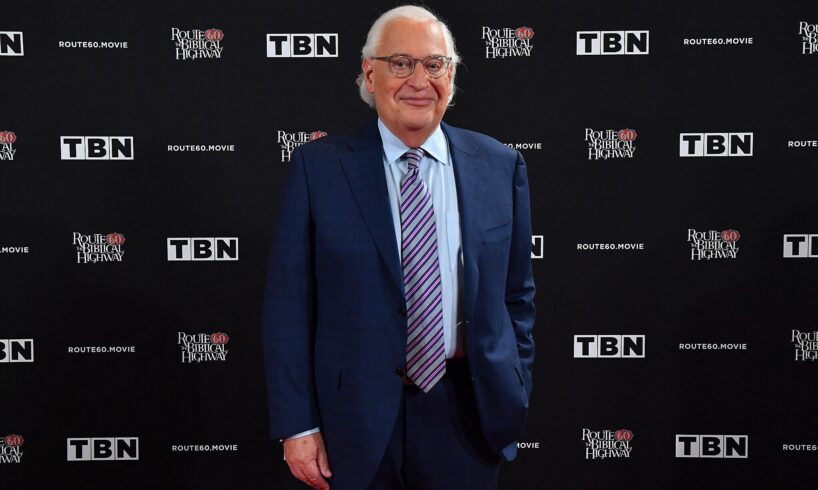
Israeli-founded spyware firm NSO Group has appointed former US ambassador to Israel David Friedman as executive chairman, as part of a bid to get off Washington’s blacklist, where it was placed in 2021 for facilitating “transnational repression.”
The appointment of Friedman, a staunch supporter of Israeli settlements and annexation of the West Bank, comes after a group of US investors, led by Hollywood producer Robert Simonds, purchased a controlling stake in NSO last month.
NSO’s founders — Niv Karmi, Shalev Hulio, and Omri Lavie, whose first names form the acronym in the firm’s title — are no longer shareholders in the embattled espionage firm that they launched in 2010.
Addressing NSO employees at the company’s headquarters in Ramat Hashron, in central Israel, Friedman stressed the critical role that NSO’s technology “plays in supporting governments in their efforts to combat terrorism and serious crime.”
“The researchers and engineers of NSO represent some of the most brilliant minds in Israel’s incredible high-tech industry,” said Friedman, who served as ambassador to Israel in US President Donald Trump’s first administration.
Get The Times of Israel’s Daily Edition
by email and never miss our top stories
By signing up, you agree to the terms
“Notwithstanding the adverse attention often directed at the company – most of it unfair — you continue working around the clock to deliver advanced technologies to those whose mission is to protect the public and save lives,” he said.
Illustrative: A person holding a smartphone showing the NSO Group Technologies website next to a screen with the company’s logo (T. Schneider/Shutterstock.com)
‘Make Americans safer’
NSO has been repeatedly accused of knowingly selling its products to authoritarian regimes that use it to spy on critics. The company insists its spyware is sold only to “authorized governments,” after Israeli Defense Ministry approval, to fight terrorism.
The company said Sunday that it would continue to operate from Israel under the full regulatory authority of the Defense Ministry, as it expands its global footprint and seeks to resume operations in the US.
In 2021, finding that the company had acted “contrary to the foreign policy and national security interests of the US,” then-US president Joe Biden barred NSO from purchasing certain technologies in the US.
In 2023, Biden also signed an executive order banning the US government from using commercial spyware that “poses risks to national security or has been misused by foreign actors to enable human rights abuses around the world.”
Then-US president Joe Biden arrives to speak at the State Department in Washington, DC, on January 13, 2025. (Roberto Schmidt/AFP)
NSO’s efforts to push back on US scrutiny have seen the firm spend some $7.6 million on lobbying in Washington between 2020 and 2024, and appeal personally to Prime Minister Benjamin Netanyahu and to Trump’s adviser and son-in-law Jared Kushner, according to reports by The Wall Street Journal, and the Israeli market daily The Marker.
According to the Journal, US agencies are unlikely to do business with NSO unless Biden’s 2023 executive order is rescinded.
In an interview published by that paper on Sunday, Friedman, who splits his time between Florida and Israel, said he would make the case to the Trump administration that NSO’s technology could help make Americans safer.
“If the administration, as I expect they’ll be, is receptive to considering any opportunity that might keep Americans safer, it will consider us,” said Friedman.
He also said preventing NSO spyware from being abused would come down to finding trustworthy clients, and that he would seek to sell NSO’s products to US law enforcement agencies, including police units.
US President Donald Trump, center, is flanked by then-ambassador to Israel David Friedman, left, and then-senior adviser Jared Kushner in the Oval Office of the White House in Washington on August 12, 2020. (AP/Andrew Harnik)
“The NSO of today is a far more careful company in how it licenses its technology than it was five six years ago,” he said, adding that the company has been hobbled by its legal challenges.
“They have been struggling and looking for capital. This change of control and ownership brings with it sufficient capital to maintain the business,” he said.
NSO’s Pegasus spyware, which targets various smartphone apps, allows users to remotely activate phones and extract their data.
The spyware has reportedly been used by Saudi Arabia, India, and Poland’s previous, right-wing government, among others, to clamp down on dissent. It has also made waves in Israel, where, in 2023, against the appeals of the attorney general and former top security officials, Justice Minister Yariv Levin established a commission of inquiry into police’s use of the spyware.
Last month, a US court delivered a blow to NSO by ordering it to stop targeting WhatsApp.
Speaking to the Journal, Friedman called the ruling “a meaningful setback, not only for NSO Group, but potentially for the people who benefit from this surveillance.”
You appreciate our journalism
You clearly find our careful reporting valuable, in a time when facts are often distorted and news coverage often lacks context.
Your support is essential to continue our work. We want to continue delivering the professional journalism you value, even as the demands on our newsroom have grown dramatically since October 7.
So today, please consider joining our reader support group, The Times of Israel Community. For as little as $6 a month you’ll become our partners while enjoying The Times of Israel AD-FREE, as well as accessing exclusive content available only to Times of Israel Community members.
Thank you,
David Horovitz, Founding Editor of The Times of Israel
Join Our Community
Join Our Community
Already a member? Sign in to stop seeing this





